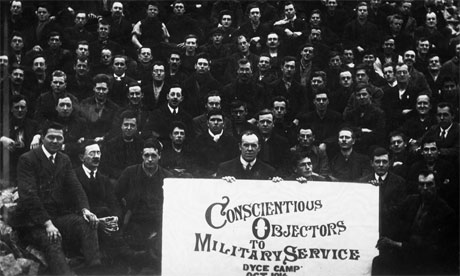The men who would not fight
After reading, in quick succession, four books about the men who fought the war, I took out a box of flimsy, yellowing letters, and tried yet again to imagine what my grandfather went through.
He had three small daughters, which saved him from conscription, and his attempt to volunteer was turned down in 1914 because he was short-sighted.
But in 1916, as he walked home to south London from his office, a woman gave him a white feather (an emblem of cowardice). He enlisted the next day. By that time, they cared nothing for short sight. They just wanted a body to stop a shell, which Rifleman James Cutmore duly did in February 1918, dying of his wounds on March 28.
My mother was nine, and never got over it. In her last years, in the 1980s, her once fine brain so crippled by dementia that she could not remember the names of her children, she could still remember his dreadful, useless death. She could still talk of his last leave, when he was so shellshocked he could hardly speak and my grandmother ironed his uniform every day in the vain hope of killing the lice. She treasured his letters from the front, as well as information about his brothers who also died.
She blamed the politicians. She blamed the generation that sent him to war. She was with Kipling: "If any question why we died, / Tell them, because our fathers lied." She was with Sassoon: "If I were fierce, and bald, and short of breath / I'd live with scarlet majors at the Base, / And speed glum heroes up the line to death ... And when the war is done and youth stone dead / I'd toddle safely home and die - in bed."
But most of all, she blamed that unknown woman who gave him a white feather, and the thousands of brittle, self-righteous women all over the country who had done the same. And there were thousands of them, as Will Ellsworth-Jones makes clear in his fascinating account of a group of conscientious objectors, We Will Not Fight. After the war, Virginia Woolf suggested there were only 50 or 60 white feathers handed out, but this was nonsense - as Ellsworth-Jones's diligent research shows.
Some of his stories still have the power to make the reader angry. A 15-year-old boy lied about his age to get into the army in 1914. He was in the retreat from Mons, the Battle of the Marne and the first Battle of Ypres, before he caught a fever and was sent home. Walking across Putney Bridge, four girls gave him white feathers.
"I explained to them that I had been in the army and been discharged, and I was still only 16. Several people had collected around the girls and there was giggling, and I felt most uncomfortable and ... very humiliated." He walked straight into the nearest recruiting office and rejoined the army.
Extracted from the Guardian, May 17 2008. The Order of the White Feather, founded in August 1914 by Admiral Charles Fitzgerald, encouraged women to give out white feathers to young men who had not joined the British army.
The plight of objectors: letters from the time
"Jack FG. If you are not in khaki by the 20th I shall cut you dead. Ethel M."
Personal column of the Times, July 8 1915
"I was taken to the Tower of London and locked in a large dungeon where there were 20 or so prisoners. Six were objectors. I was to be taken to Chester Castle and my wife travelled with me. The Cheshire Regiment did not have a good reputation for its treatment of objectors.



